
7 Best Electronics Kits for Adults
Read stories how our founder Albert turned his childhood passion into CircuitMess, and get exciting DIY project ideas you can do with your kids at home for free.
Table of content
Electronics are cool—that's an undeniable fact. However, this field of technology might seem inaccessible if you've never had the chance to get hands-on experience with it.
Luckily, you don't need to be an expert or a technology prodigy to work on projects that get you closer to building, soldering, and coding your own electrical devices or robots.
There's an entire world of electronics kits that provide instructions and guide hobbyists through their experiment-filled exploration.
But before we show you how you can start your electrically-charged journey today, we'll first see why you'll need more than educational YouTube videos and tech books.
The power of hands-on learning for both kids and adults
Have you ever noticed how adults are often encouraged to learn new languages by watching TV shows or brush up on history by visiting museums, while kids are simply handed textbooks?
Other than having fun, there are more reasons why we shouldn't limit the learning experience to textbooks alone.
While traditional methods do have their place in education, we often forget how much more effective active learning is. For instance, a PNAS study has found that students in STEM classes with traditional lecturing are 1.5 times more likely to fail their classes compared to those who engage in active STEM learning.

The impact of active, hands-on learning goes beyond passing or failing classes. It also helps students apply their skills to real-life situations and challenges.
And for adults, active learning means breaking away from the passive consumption of information and embracing a journey of discovery that enriches personal growth.
Hopefully, reading this has motivated you to learn a new skill or to finally realize your dream of tinkering with electronic devices.
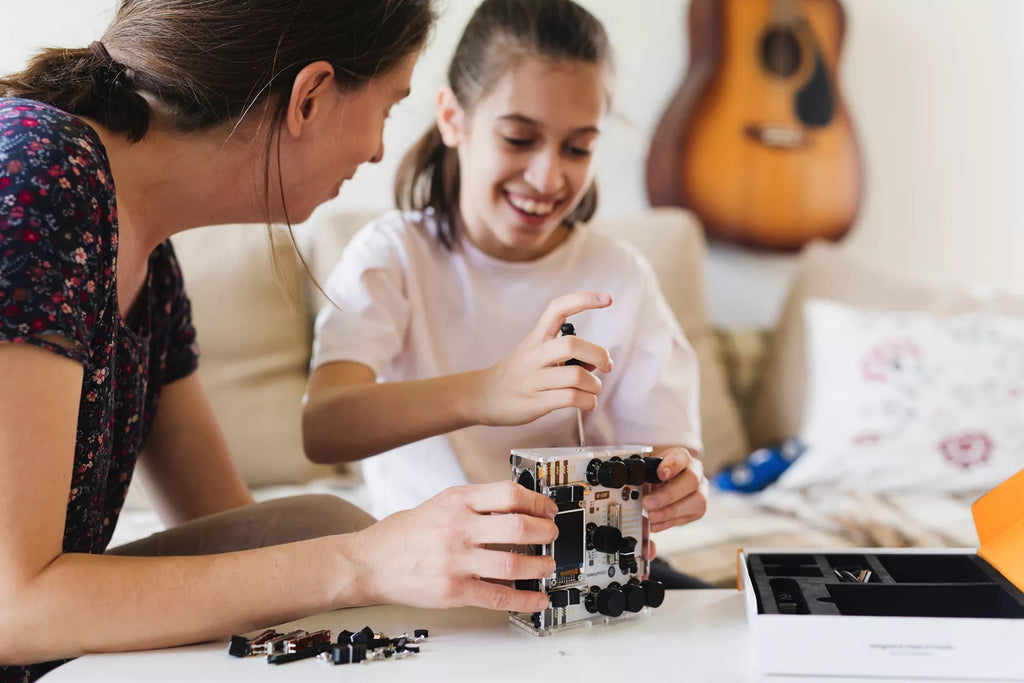
Keep reading to find out learning about electronics is an excellent choice of a hobby.
Why should your kids learn with electronics kits?
You probably won't be surprised to learn that there's an overlap between the benefits that electronics and related STEM projects bring to both kids and adults.
Well, you probably wouldn't ask your kids to fix your dishwasher after their first projects. Other than that, here's a list of some of the reasons why electrical engineering activities and projects are great for kids ages 9 to 99, as they like to say on board game boxes.
- Problem-solving skills: You can't just snap together any electrical components and hope for the best. To bring your own creations to life, you have to plan your solution, implement it, adapt if challenges arise, and persist until you've succeeded. That's as fun as problem solving gets!
- Technological literacy: Most kids know how to operate a ceiling fan, but do we know how it works? By playing with simple circuits, we can gain hands-on experience and actively learn how electronic everyday objects around us work.
- Confidence building: Successfully navigating the challenges in electronics projects boosts self-confidence, regardless of whether you're a child or an adult.
An honorable mention goes to safety goggles. They don't only protect your eyes, but also make you look cool while tinkering with circuit boards.
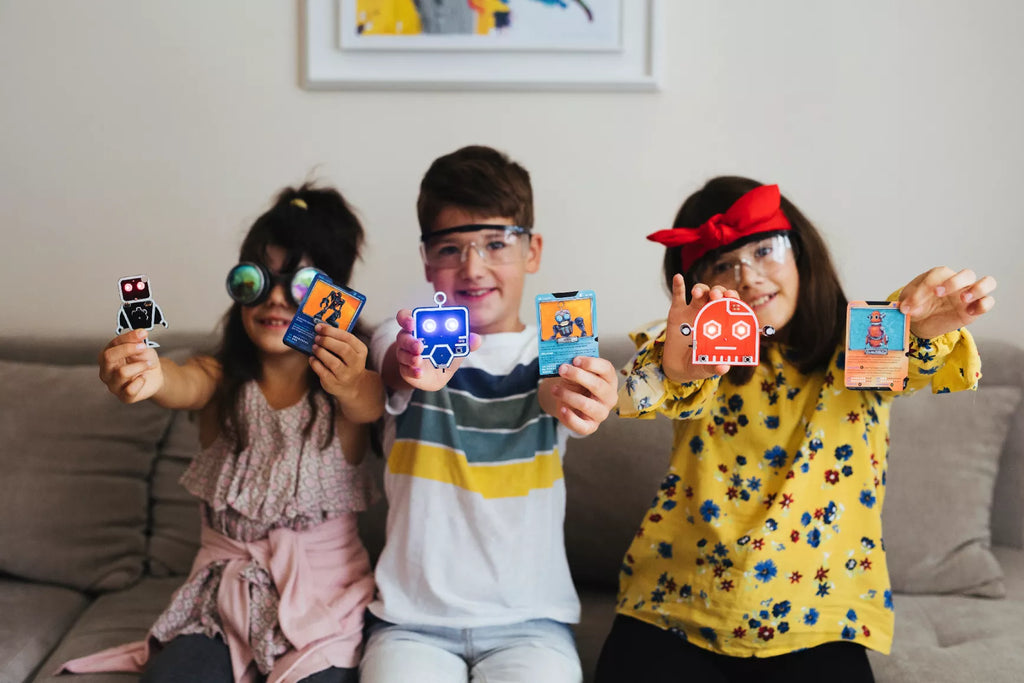
Safety first, style second.
On that note, we should say that it's recommended to carry out electronics projects under adult supervision.
Now, you don't want to spend ages gathering snap wires, alligator clips, motors, and other individual components. That's why you should get an electronics discovery kit and start having educational fun straight away.
What to look for in a DIY electronics kit?
Not all electronic kits are made the same, so it's vital to look for these crucial features to find the right STEM kit for your needs.
- Step-by-step instructions: Look for clear and beginner-friendly instructions to guide you through each project.
- Community support: The best electronics kits come with access to online communities where you can seek help, share your projects, and get inspired by others.
- Educational value: Choose kits that explain the principles behind each project, helping you understand the science and engineering concepts at play.
- Coding capabilities: Some kits offer opportunities toprogram robots andcreate smart devices, enhancing your learning experience and expanding your skill set.
Of course, the best electronics kit for you or your kid is the one that matches your interests. Make sure you explore the options before purchasing and find a themed kit that sparks joy (and hopefully not wires).
Top 7 electronics kits for kids (and adults)
To help you narrow down your search, we've rounded up seven electronic kits for kids and adults alike. These kits aren't here by accident—they've earned their spot because they offer a fun and educational experience with top-notch components.
Kit #1: CircuitMess STEM Box
You don't want to limit yourself to one field to explore? If so, you should get a CircuitMess STEM Box. In addition to electronics, this kit lets you explore robotics, AI, the Internet of Things, and more.
There are multiple STEM Box projects you can choose from. For instance, you could build Clockstar, a DIY smartwatch. Or, maybe assembling, coding, and driving your own smart car toy would be more up your alley.
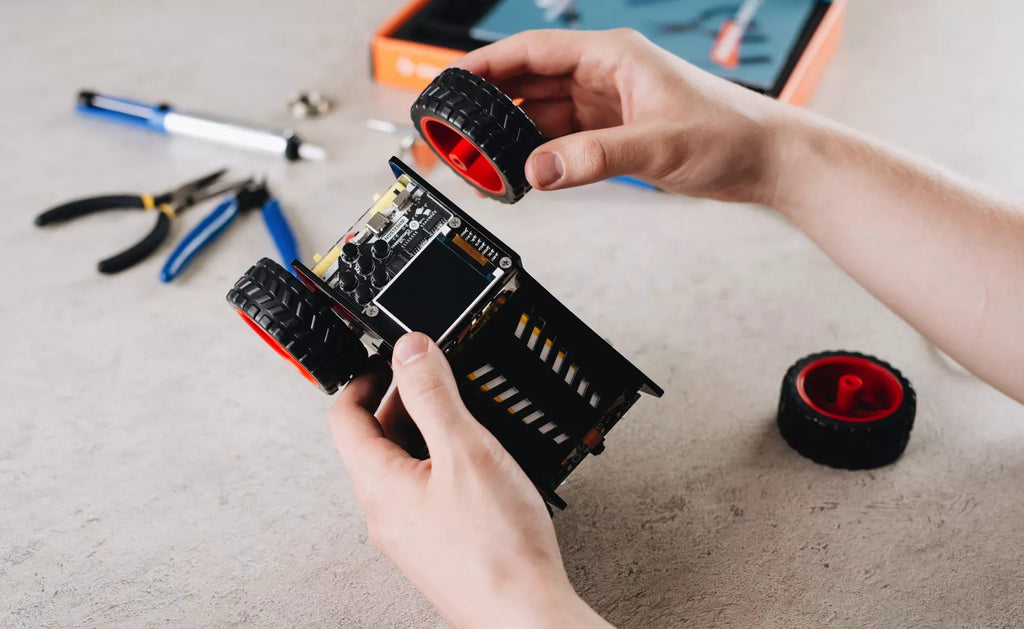
Either way, you're bound to find an electronics exploration kit that suits your needs.
Why this kit?
There's no better way to learn about how smart devices work than by building them yourself.
With STEM Box, you get a guided adventure that teaches you the basics of electronics and technology.
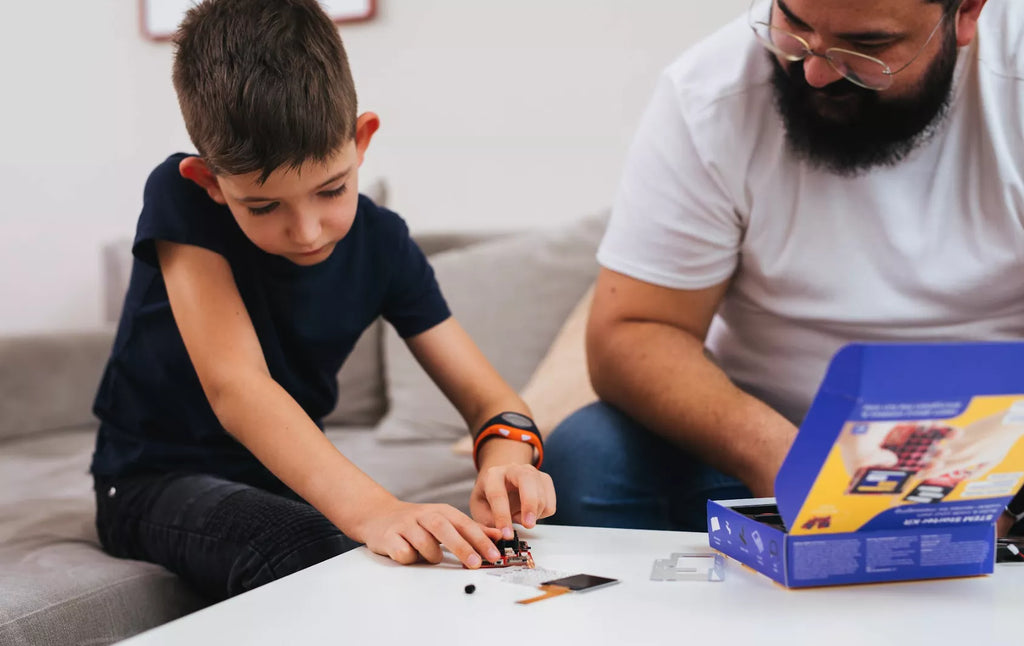
You also get to have fun and play with your creations and experiment with their capabilities. In other words, these educational toys are versatile tools that will get your creative thinking gears turning.
Pricing
The thing that sets the STEM Box apart from other kits is that it's actually a subscription line. You can purchase individual boxes in the form of bundles, but you can also subscribe and receive new fun projects every three months. The subscription plans are as follows:
- $99 for a one-off purchase of an individual box
- A yearly subscription ($87 per box)
- A two-year subscription ($79 per box)
Choosing a yearly or a two-year subscription also gets you a free toolbox, meaning that you can grab a soldering iron and start building immediately.
Kit #2: SmartLab Smart Circuits
An excellent thing about electronics as a hobby is that you get to explore this area of science from various angles and different levels of difficulty.
If you're looking for a more basic entry point suitable for young kids or absolute beginners, you might want to consider Smart Circuits: Electronic Lab, a kit made by SmartLab.
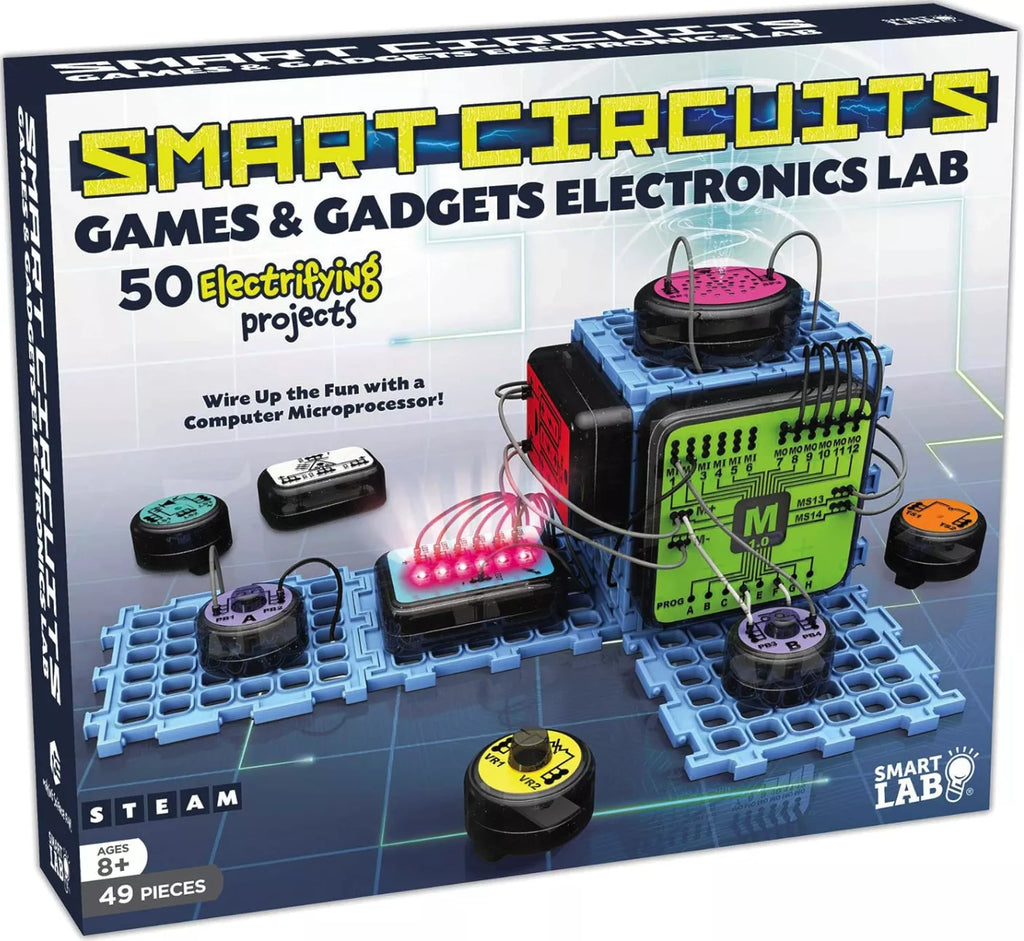
Similarly to the well-known kits Elenco Snap Circuits Jr. or Snap Circuits Light, the Smart Circuits kit lets you build various gadgets with snap-together boards and connecting modules to the battery.
Why this kit?
This kit is great for those who aren't yet ready to start soldering. Luckily, there are other ways to create working electrical circuits, and Smart Circuits shows you how.
Your little future engineer can use this kit and play with LED lights, have fun producing sounds, or create gadgets like motion-sensing room alarms. All of this is possible with an easy plug-and-play wiring system that requires little to no adult supervision.
Pricing
You can get this kit for $49.99. The price includes 49 components and a 48-page science activity book, but you'll need to buy the three AAA batteries that power the thing separately.
Kit #3: Makeblock mBot
Not everyone finds circuitry and hardware fascinating. Some are more interested in programming and robotics, and that's where Makeblock's mBot comes in handy.
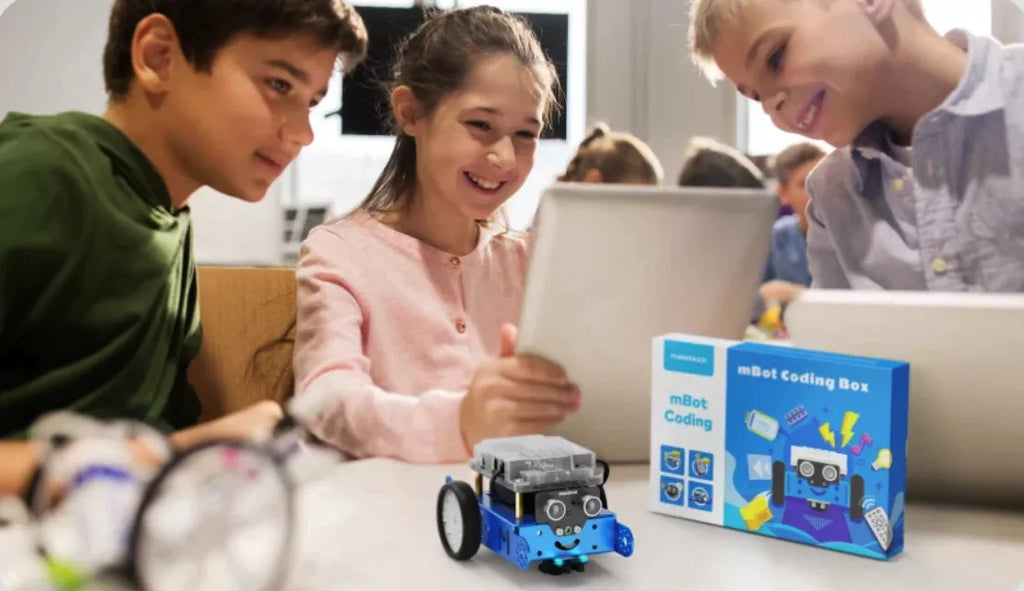
mBot is one of those robotics educational toys that are as simple as they are fun. After the easy assembly process, you can code the robot to perform simple tasks and make it move around.
Why this kit?
In addition to kid-friendly design, mBot provides an approachable intro to block coding, which is the easiest way to learn programming.
And if you don't mind spending some extra money on add-ons, you can also upgrade this electronic learning kit for kids with additional accessories such as cameras or a robotic arm, expanding the bot's capabilities.
Pricing
The regular version of mBot costs$89.99. If you seriously get into robotics and want to broaden your horizons with DIY robots, you can upgrade to the Ultimate 10-in-1 Building kit for $399.99.
Kit #4: micro:bit
Micro:bit is a programmable device whose size is best explained by its name—it's tiny. Essentially, it's a board with sensors, LED lights, a speaker, a microphone, buttons, and other components that allow you to customize the micro:bit and transform it into any sort of gadget you like.
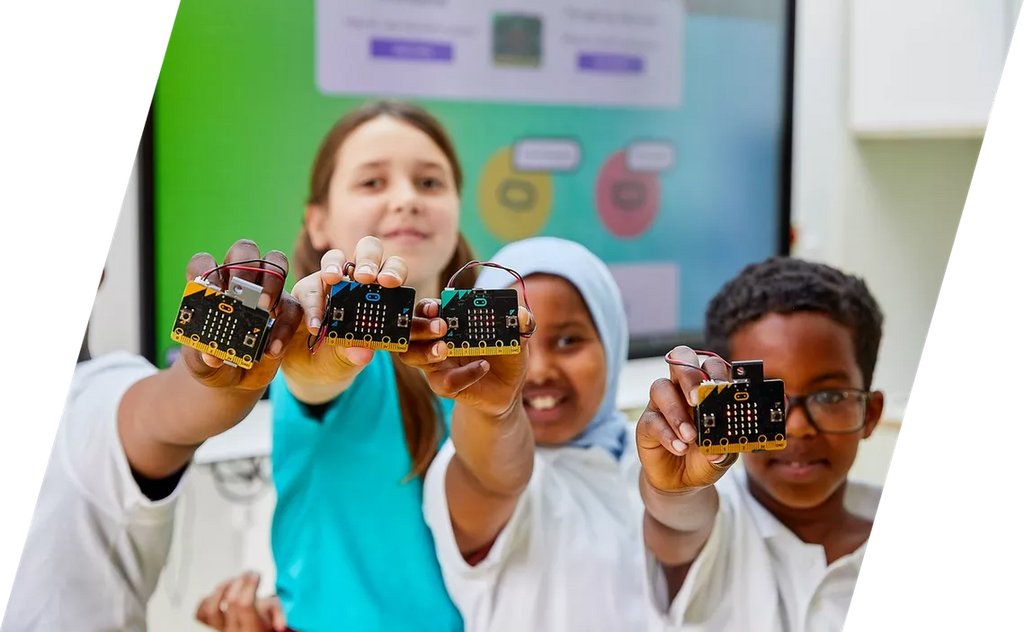
Fun fact: micro:bit was made by BBC "to encourage kids to learn how computers work, rather than simply consuming media on them". We think it carries out its duty perfectly!
Why this kit?
While other kits tend to have limited use, micro:bit can become almost whatever you want it to become. For instance, you can transform it into a step counter, electronic lock, a musical instrument, an AM radio, or an animation display.
This kit truly gives new meaning to using kits to unleash innovation, creative thinking, and problem solving.
Pricing
While you can't purchase micro:bit directly from the manufacturer, you can find an official list of resellers and find one close to you. Depending on your location, you'll pay $15 and up for the board only. A fully functional micro:bit is sold at around$18.
Kit #5: Arduino Student Kit
Not into cutesy design? No problem.
Arduino Student Kit is here to guide you while you build robots or program your own devices.
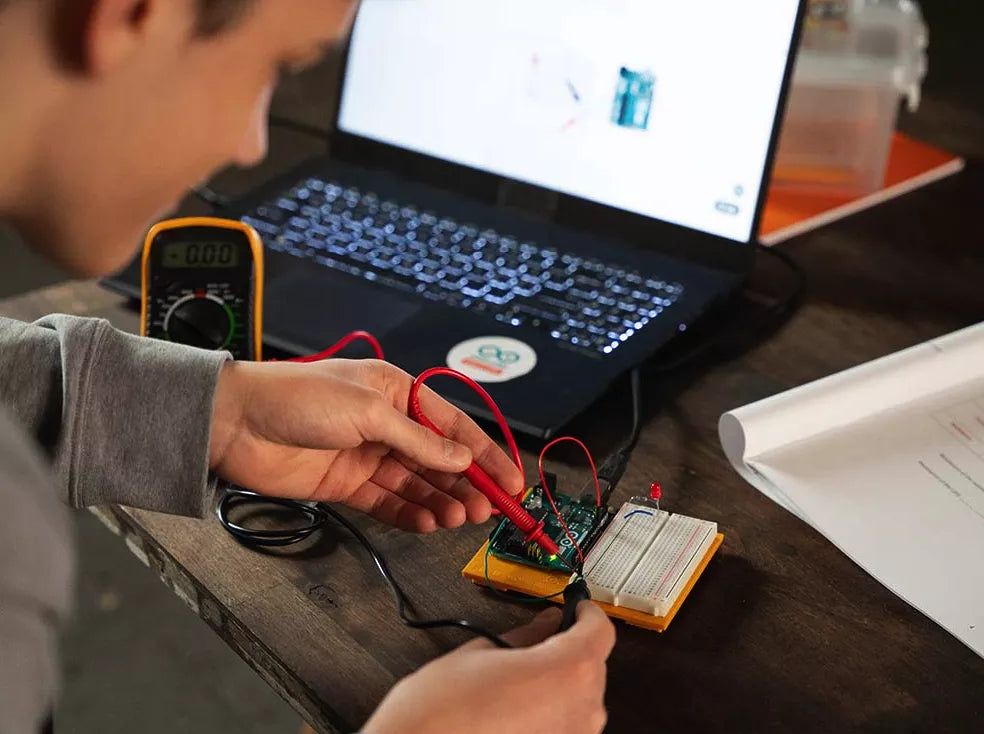
This electronics exploration kit is great for those who prefer a more practical and robust approach to electronics and programming. It helps you explore the world of Arduino, an open-source electronics platform widely used in the maker and educational communities.
Why this kit?
One of the standout features of Arduino is its versatility.
Flexible STEM toys like this one allow you to explore a wide range of projects, from simple experiments with color-changing LED lights, to projects that you can actually use in real life. For instance, you can create a security system that sends an alert to your phone when it detects motion, a smart plant pot that waters the plant automatically, and more.
Pricing
The Arduino Student Kit is sold for$67 on the official website.
Kit #6: KidzLabs Robotic Hand
Let's not forget the role the mechanics have in technology and robotics. If you're looking for a hands-on experience to hone your mechanical skills, check out the KidzLabs Robotic Hand created by 4M.
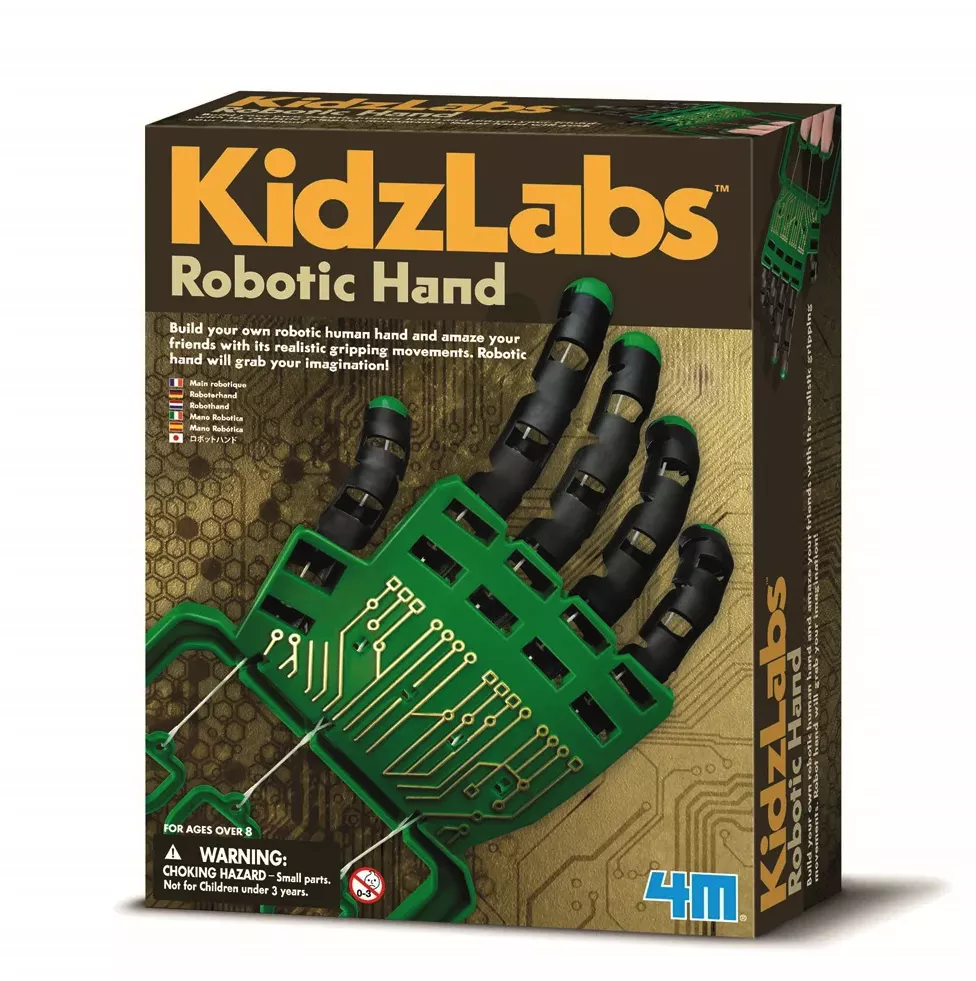
Unfortunately, the PCB traces on the hand are purely decorative. Still, the precision required to thread strings and put together the mechanical components of the hand fosters dexterity and coordination, making it a fun and educational experience.
Why this kit?
This kit may not contain motors or batteries, but it's an excellent preparatory project for more advanced electronic endeavors that require precision, such as soldering or working with delicate electronic components. You wouldn't want to damage your own circuits when you get to that stage, right?
Also, the hand's realistic gripping movements offer a preview of the mechanical principles that are the core of real robotic engineering.
Pricing
The manufacturer sells this robotic hand for$18, making this an affordable intro to mechanical exploration.
Kit #7: NASA Perseverance Rover kit
We'll end the list with a real treat for all science lovers: the NASA Perseverance Rover kit. If you've ever dreamed of exploring other planets, here's your chance.
This electronics kit is a replica of NASA's Perseverance rover that you can use to simulate exploration of the Red Planet at your home.
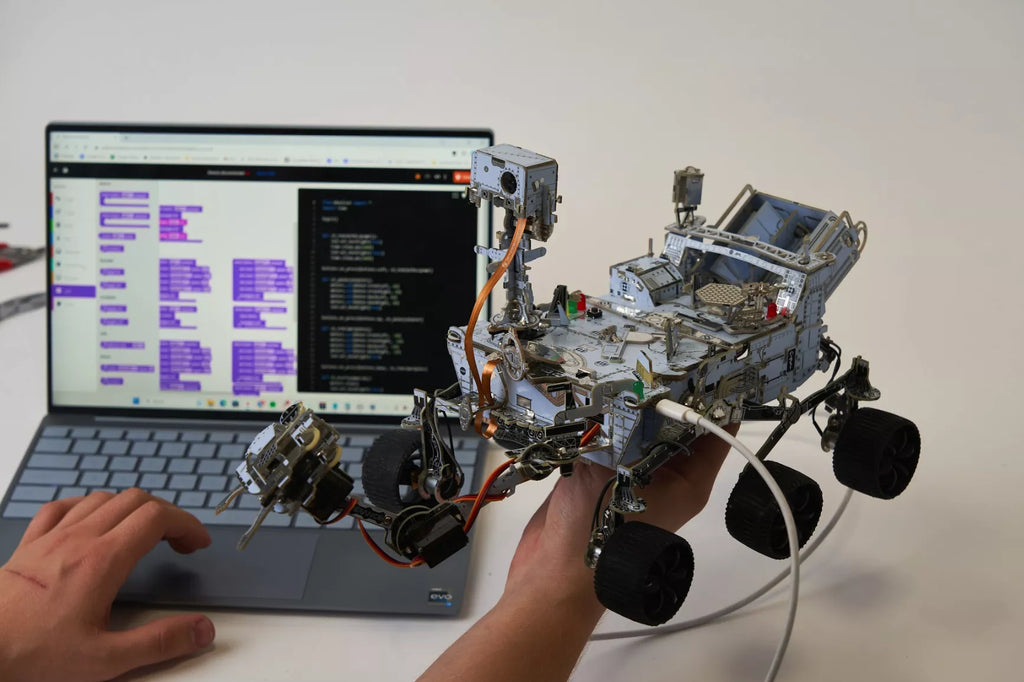
Of course, to play with the rover, you first have to assemble it, learning about the mechanical and electrical components that make it work. Then, you get to move it around with a Wi-Fi controller.
You probably don't have real Martian rocks lying around in your home, but that shouldn't stop you from exploring like a true scientist. With this kit that includes a servo-powered robotic arm, you can practice collecting samples (that may or may not come from your backyard) and perform tasks, just like the real Perseverance rover does on Mars.
You'll also learn about computer vision and AI as you program the rover to test the soil and navigate the terrain.

However, there's a small hitch—you can't grab this kit just yet because it first needs to launch on Kickstarter!
But here's the good news: you can be among the first to embark on this interplanetary science journey. Visit the NASA Rover page, enter your email, and you'll get notified as soon as the campaign launches. We'll see you there!
How to know which electronics kit is the best one for you?
You shouldn't let the sheer multitude of electronic kits on the market stop you from immediately demystifying how motors and circuits work.
The number of choices might seem overwhelming, but you can overcome the challenge by prioritizing your interests. Asking yourself what specific skills you want to learn through STEM activities will help you narrow down your options, along with deciding on how much time and money you are willing to invest.
Don't worry; the right kit for you is out there somewhere, waiting to be found.
And just a hint - if you're looking for a DIY STEM kids subscription box, you should check our 2023 list of best subscription boxes for kids! Or simply pick one of ours!
Select one of CircuitMess DIY electronics projects
Quality components, fun design, and hardware and software skill-building opportunities are the guiding principles behind every CircuitMess project.
We offer an array of fun projects, all of which come with detailed instructions and are suitable for kids, beginners, or adult electronics and science enthusiasts. And if you already have some experience in engineering, you still won't be disappointed: you can use your coding knowledge to upgrade your DIY projects with extra features.
If you're looking for the best electronics kits that focus solely on hardware, we suggest that you check out Wacky Robots, our line of robotic creations that will help you learn about circuits, soldering, and batteries.
Those who also want to tackle a combination of hardware and software should definitely check out the STEM Box line that teaches the basics of electronics, and lets you experiment with your creations by putting their abilities to the test.
Regardless of your interests, rest assured that we have exciting projects waiting for you.
Read stories how our founder Albert turned his childhood passion into CircuitMess, and get exciting DIY project ideas you can do with your kids at home for free.
Read more

The Ultimate Gift Guide: Best Robot Toys for Kids
Discover the best fun creative toys for adults: DIY electronics, creat...

Creative Toys for Adults—Build, Play, and Discover New Hobbies
Discover the best fun creative toys for adults: DIY electronics, creat...

What is STEM? A Fun and Future-Focused Way to Learn
Curious about STEM? Explore how it brings Science, Technology, Enginee...
